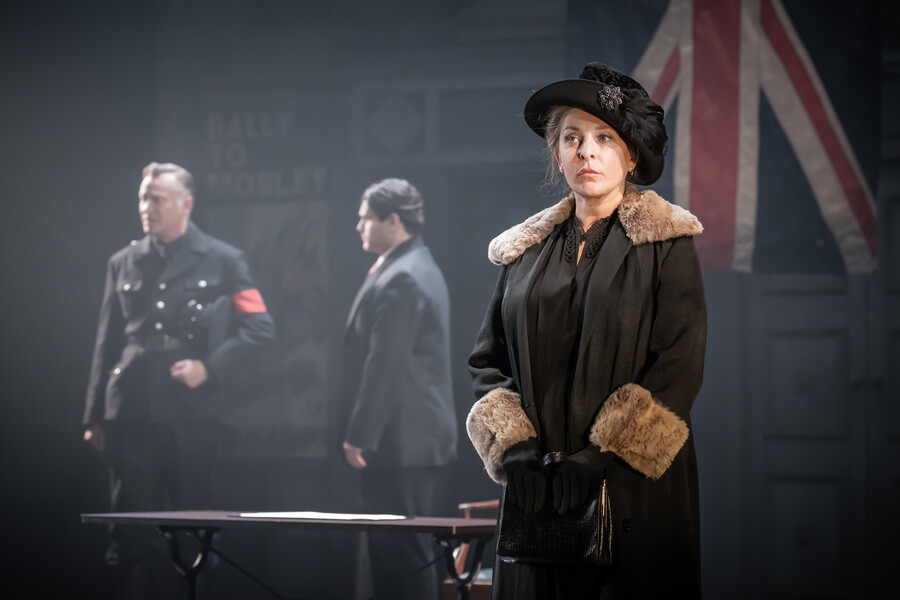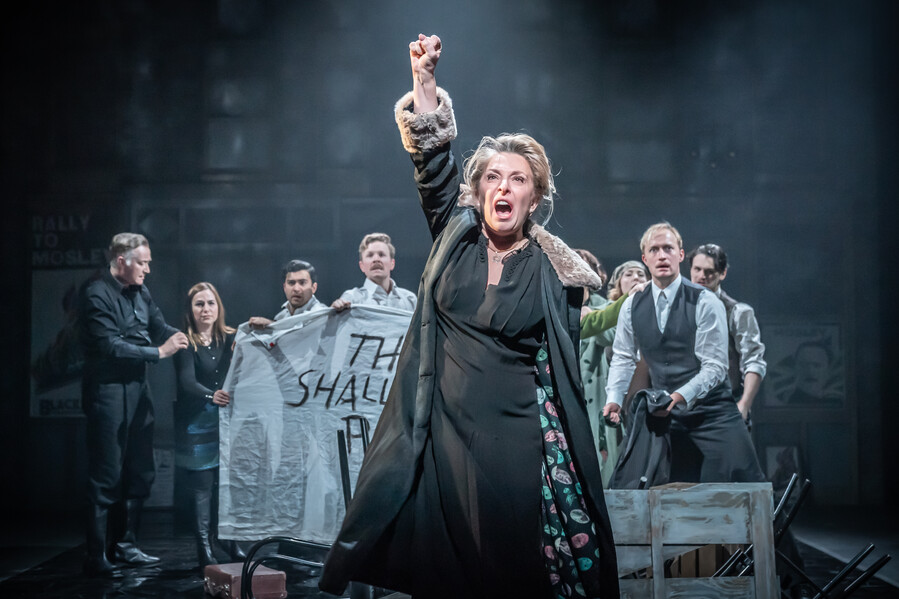
21 September – 10 February
It is 1936. Oswald Mosley is parading his fascist Blackshirts through the East End streets of London in a direct and openly racist provocation of Jewish neighbourhoods. The Battle of Cable Street is about to erupt, where an alliance of anti-fascists will gather en masse to prevent their progress. To the rear of the stage, designer Liz Cooke has constructed a facsimile of a Cable Street frontage, complete with doors and windows, painted an ominous black.
In this febrile atmosphere we find a new Shylock. Tracy-Ann Oberman is likely to be in her career-defining role as the first female in the role of the money-lender. Oberman infuses her Shylock with a huge sense of connection to her community, at the same time tinged with a bitterness from the constant racial abuse from the Christian right. She is also mocked by her housekeeper Mary Gobbo and betrayed by her daughter. As a single middle-aged woman, her oppression is multi-layered.
Oberman is centre stage for the opening scene in which she as Shylock presides over a Jewish family gathering and ritual, to which the audience has been warmly encouraged to believe they are a part of, as they will experience again at the close of the play. But projected video footage of Mosley and his followers quickly darkens the mood of this convivial and peaceful gathering.
With great irony, the merchant Antonio (Raymond Coulthard), here depicted as a Black Shirt, along with his love Bassiano (Gavin Fowler), and friend Gratiano (Xavier Starr), finds himself compromised when seeking funds to give his bosom buddy. With his capital committed elsewhere, Antonio has no other option but to sign a loan bond with the Jewish money-lender Shylock he has spat upon and insulted in the past. Shylock sees a perfect opportunity for revenge.
With subtlety, Coulthard portrays a man totally at the behest of his heart strings, blasé to the risks of his bond while determined, selflessly, to enable his (darling) friend Bassiano to woo Portia, a rich and beautiful heiress who resides in the fictitious land of Belmont. Fowler instils a palpable sense of loving devotion to Bassiono’s feelings for Antonio.
The brooding darkness of Cable Street is quickly hidden by the simple sweep of a full-length white curtain as we are transported to the opulent world of Portia, an entitled heiress modelled on Jessica Mitford. Beset by would-be suiters from around the world who try to win her hand by guessing which of three caskets contain her picture, Shakespeare has her mock these potential husbands with playful insults before a more pointed rebuke reveals an innate prejudice. In this, the play accuses all.
Hannah Morrish is a dashing Portia. Witty and glamorous, she presents a perfect foil to the embroiled Shylock. Both give the play extraordinary leverage with stand-out performances as power politics flow from one to the other.
Shakespeare plays with our sensibilities. In glorious monologue he gives the downtrodden Shylock the most eloquent testament to universal humanity; to Portia he gives the most revelatory address on the virtues of mercy. Can humans on both sides of such a prejudicial divide be right? In a time when far right ideology is again looking to command the agenda, Oberman’s closing appeal for solidarity had the audience on its feet.
★★★★☆ Simon Bishop 27 September 2023
Photo credit: Marc Brenner


